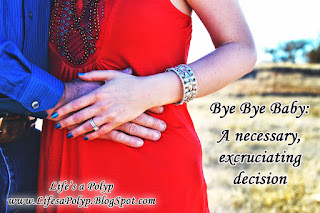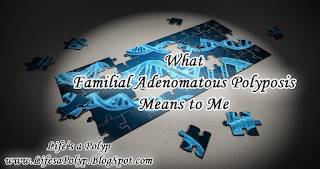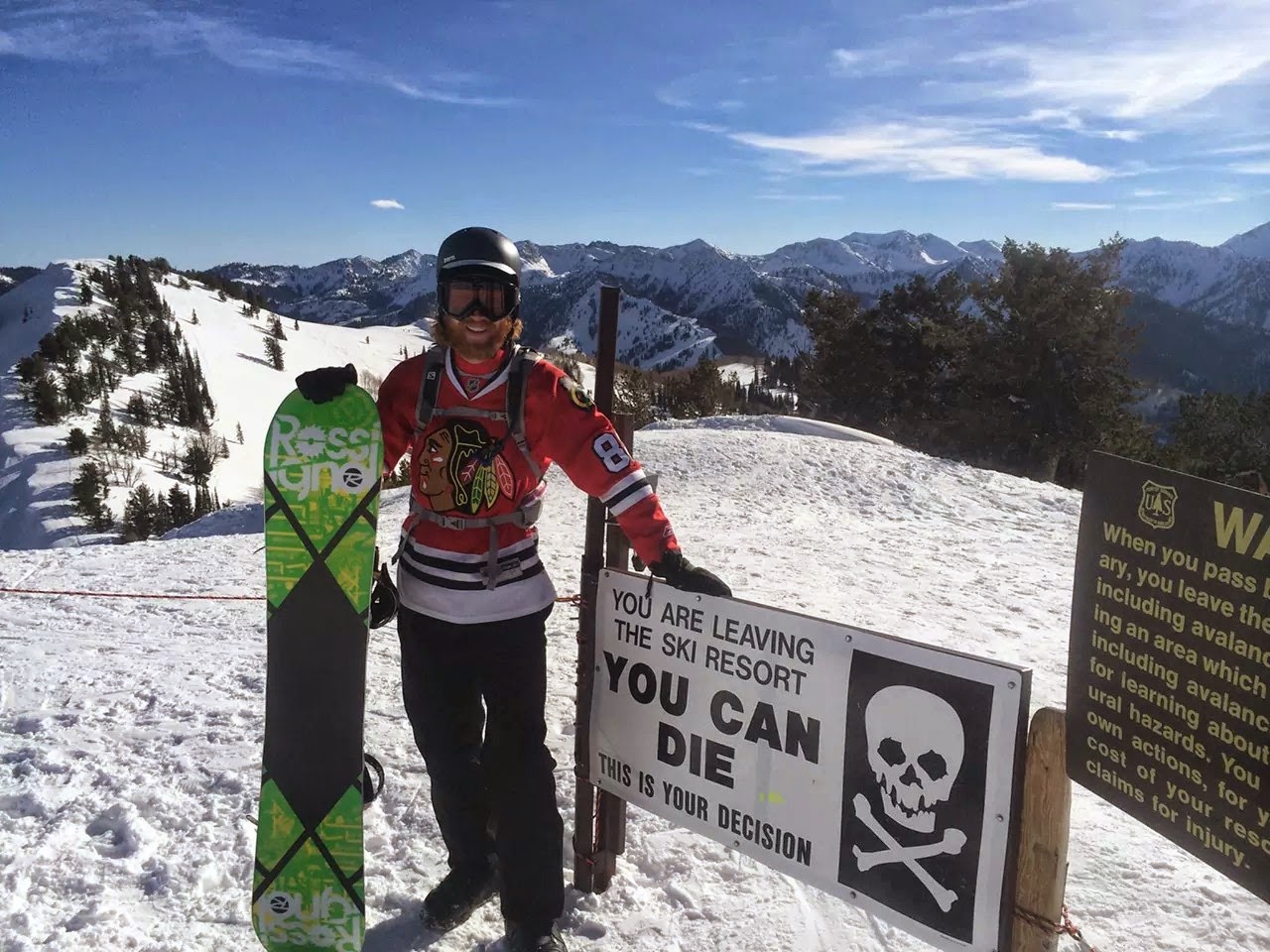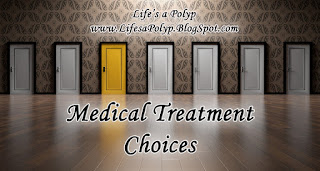This is a guest post by Daniel Shockley
My
name is Daniel Shockley, I reside in Hawaii and retired at age 43 from the Navy
in 2003 after serving 22-years on active duty. My last three years were spent while deployed to Middle East in direct
support of OPERATION ENDURING and IRAQI FREEDOM. Fast forward to May 2012, I underwent my
first colonoscopy that was scheduled at age 51. The procedure was performed by Dr.
Fernando Ona of the GI Clinic at Spark M. Matsunaga Veterans Affairs Medical
Center, Hawaii. Approximately 100 polyps
were discovered throughout my colon, rectum, and anus. A large mass was found in my ascending colon
causing an 80% blockage. Based on these
findings I was immediately referred to Susan Donlon, Certified Genetic
Counselor, Tripler Army Medical Center (TAMC), Hawaii. It was suspected I may have a gene mutation
which can be confirmed by DNA testing. The
DNA samples were gathered and sent to a molecular oncology laboratory in
California. Approximately three weeks
later the results arrived and revealed the rare gene mutation, Adenomatous
Polyposis Coli (APC), which is an inherited disorder best characterized by the
development of a myriad of polyps in the colon. These findings confirmed the diagnosis of
Attenuated Familial Adenomatous Polyposis (AFAP), which is a variant of Familial
Adenomatous Polyposis (FAP) that can best be characterized by fewer colorectal
polyps (commonly 10 – 100), later age of onset of polyps (mean age of polyp
diagnosis, 44 years), and cancer (mean age, 56 years).
It
should be noted, Dr. Henry T. Lynch, Creighton’s Hereditary Cancer Center,
Department of Preventive Medicine, is credited with the discovery of AFAP. Additionally, Dr. Lynch is one of the
founding fathers of genetic research. There are currently no statistics on AFAP. However, it is estimated that <0.03% of
the global population have this condition.
 |
| Daniel and Dr. Henry Lynch |
Upon receiving the
diagnosis of AFAP, Lt. Col. Ronald Gagliano, Chief, Colon and Rectal Surgery
and Director, Surgical Research, TAMC along with Susan Donlon, informed me surgery
was inevitable, as there is no cure for AFAP.
It must be noted leading up to the confirmation of AFAP and prior to the
colonoscopy, I considered myself to be in good health with no indications of
any problems with my colon. Furthermore,
there is no known family history of colon problems. Dr. Gagliano and Susan
Donlon encouraged me to read about my condition, the type of surgery required,
and life after surgery. This is when my personal research journey commenced. My focus from the onset was to embrace this
condition. My quest was to better
understand this disease and what impact it will have on my life. Dr. Gagliano recommended,
based on the DNA test results, that in the best practice of medicine colon
surgery is needed. I concurred and the
surgery, known as a total-proctocolectomy with ileostomy, was scheduled at
TAMC.
The surgery was
successfully performed at TAMC in July, 2012. The rectum, anus, and entire colon were
removed. A large mass in the ascending
colon turned out to be an 8cm tumor. The pathology report revealed the mass was
a tumor and was listed as high grade dysplasia.
As a result of my surgery I have an ostomy which is a prosthetic device
that collects my waste. I have adapted to this lifesaving and life changing
surgery. To date, I continue reaching out to numerous organizations, both local
and abroad, in an effort of sharing my experience. My mindset has been, and
continues to be: I tend not to think about things I am unable to control.
Medical issues I am unable to control. What I can control is my attitude and
after 5 decades on God's green earth my positive attitude has brought me this
far, why change now! Furthermore, I can attest that worrying is not the cause
of my condition. Therefore, worrying will not make it go away. Based on my
personal research of this disease, I am able to better understand my condition,
overcome adversity, adapt to my new lifestyle, and persevere with my life. .
On a personal note, I
consider having AFAP as a challenge rather than an obstacle. I continue to press on with my life with business as usual approach. As a result I have adopted four (4) words to
reflect on as part of my new journey in life as an ostomate and advocate for
colorectal cancer awareness focusing on the importance of early detection:
- Attitude = 100% (The English language contains 26 letters. If the letter "A" represents 1 and the letter "Z" represents 26 take the letters of ATTITUDE and add them up. ATTITUDE = 100) It is important to note that the word ATTITUDE is the only word in the English dictionary that equals 100.
Having a positive attitude attributed to my successful recovery. As a result my transition to this new style as an ostomate was with minimal difficulty. Furthermore, I believe attitude is permanent and mood is temporary. It is possible to have a positive attitude and be in a bad mood. However, by maintaining a positive attitude it will have a direct impact on your mood and the outcome of your life. Do not let a bad mood affect your attitude. I remind myself of this daily and try to remain positive while pressing on with my life.
- Faith: Firm Assurance Influenced Through Hope (An acronym I created on my observation of the word faith)
My analogy of the word FAITH: Having the ability of believing in something you are unable to see, but you know it is there. Example: You cannot see the prevailing trade winds; however, you can see what affect they have by the swaying of the palm trees. My positive attitude had a direct impact on my FAITH which allowed me to have a significantly better chance of overcoming adversity.
- Adapt: Attitude Determines the Ability for a Positive Transition (An acronym I created on life as an ostomate)
My analogy of the word ADAPT: After undergoing total-proctocolectomy with ileostomy surgery I had to adjust to this new lifestyle without a colon. An ileostomy can be best described as a stoma. This is a surgical opening constructed by bringing the end of the small intestine out onto the surface of the skin on the lower right abdominal area. The intestinal waste passes through the ileostomy and is collected in a prosthetic pouching system which is adhered to the skin over the stoma. The pouching system requires changing every 3 – 4 days. Having an ileostomy is a transition to a life changing experience.
It is evident my positive attitude directly influenced my faith which directly aided with my ability to adapt to lifestyle as an ostomate. From the onset I embraced being an ostomate as a challenge rather than an obstacle or disappointment.
-
- Passion: My positive attitude along with my strong faith directly impacted my ability to adapt to this new lifestyle with an ileostomy. As a result I have a yearning to share my story, the importance of colorectal cancer awareness, early detection and AFAP. This in hopes it will be a source of encouragement and inspiration for the masses. Additionally, on behalf of the Fight Colorectal Cancer and Colon Cancer Alliance I have been asked to represent both organizations in Hawaii and request Hawaii Governor David Ige and Honolulu Mayor Kirk Caldwell to proclaim March 2015 National Colorectal Cancer Awareness month in Hawaii and Honolulu respectively.
 |
| Honolulu Managing Director Ceremony Proclaiming March 2015 as Colorectal Cancer Awareness Month |
 |
| Governor Ige Proclamation of March 2015 as Colorectal Cancer Awareness Month |
Together we can make a difference
on sharing the importance colorectal cancer awareness and early detection.
Daniel Shockley was diagnosed with Attenuated Familial Adenomatous Polyposis (AFAP), a subtype of Familial Adenomatous Polyposis. Since diagnosis, surgery to remove a pre-cancerous tumor and create an ileostomy, Daniel has made it his mission to spread awareness about colorectal cancer and the importance of early detection. In addition to public speaking, Daniel also uses his experiences to advocate for legislation in support of colorectal cancer detection and treatment programs. All of Daniel's efforts can be followed through The FAP Gene Support Organization, based in England.
Learn the differences between FAP and AFAP.















.jpeg)

















